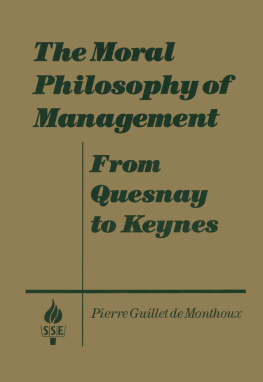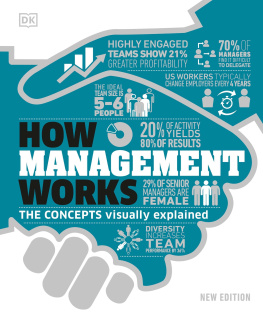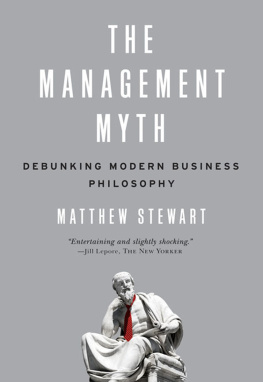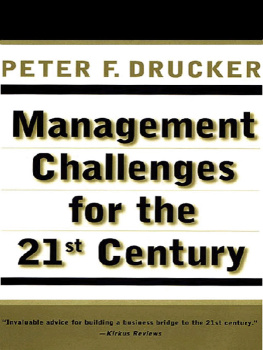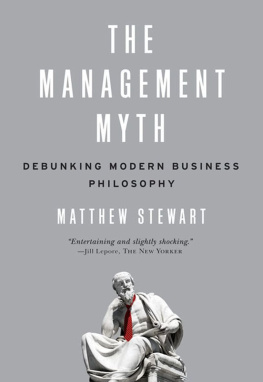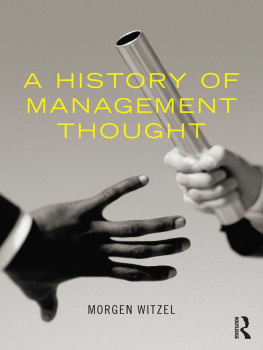The Moral Philosophy of Management
Studies in Socio-Economics
MORALITY, RATIONALITY, AND EFFICIENCY
NEW PERSPECTIVES ON SOCIO-ECONOMICS
Richard M. Coughlin, editor
SOCIO-ECONOMICS
TOWARD A NEW SYNTHESIS
Amitai Etzioni and Paul R.Lawrence, editors
INSTITUTIONAL CHANGE
THEORY AND EMPIRICAL FINDINGS
Sven-Erik Sjstrand, editor
THE MORAL PHILOSOPHY OF MANAGEMENT
FROM QUESNAY TO KEYNES
Pierre Guillet de Monthoux
The Moral Philosophy of Management
From Quesnay to Keynes
Pierre Guillet de Monthoux
First published 1993 by M.E. Sharpe
Published 2015 by Routledge
2 Park Square, Milton Park, Abingdon, Oxon OX14 4RN
711 Third Avenue, New York, NY 10017, USA
Routledge is an imprint of the Taylor & Francis Group, an informa business
Copyright 1993 Taylor & Francis. All rights reserved.
No part of this book may be reprinted or reproduced or utilised in any form or by any electronic, mechanical, or other means, now known or hereafter invented, including photocopying and recording, or in any information storage or retrieval system, without permission in writing from the publishers.
Notices
No responsibility is assumed by the publisher for any injury and/or damage to persons or property as a matter of products liability, negligence or otherwise, or from any use of operation of any methods, products, instructions or ideas contained in the material herein.
Practitioners and researchers must always rely on their own experience and knowledge in evaluating and using any information, methods, compounds, or experiments described herein. In using such information or methods they should be mindful of their own safety and the safety of others, including parties for whom they have a professional responsibility.
Product or corporate names may be trademarks or registered trademarks, and are used only for identification and explanation without intent to infringe.
Library of Congress Cataloging-in-Publication Data
Guillet de Monthoux, Pierre, 1946
The moral philosophy of management: from Quesnay to Keynes
Pierre Guillet de Monthoux.
p. cm.(Studies in socio-economics)
Includes bibliographical references and index.
ISBN 1563240815 (cloth) ISBN 1-56324-377-6 (pbk)
1. Industrial managementHistory. 2. Industrial management
PhilosophyHistory. 3. Managerial economicsHistory.
4. EconomicsHistory.
I. Title.
II. Series.
HD30.5.G85
1993
658'.001dc20
9316576
CIP
ISBN 13: 9781563243776 (pbk)
ISBN 13: 9781563240812 (hbk)
To
Albert Danielsson
Contents
Chapter 2. Pleasure and Enterprise:
The Foundation for The Wealth of Nations 25 |
Chapter 3. Men, Food, or Machines:
Entrepreneurs Who Saved Profits But Destroyed Economy 46 |
Chapter 5. Good Management in Harmonic Stagnation:
Business Economics and Ethology in John Stuart Mill 90 |
Chapter 6. From Bookkeeping to General Equilibrium:
Management in the Doctrine of Lon Walras 117 |
Chapter 7. Enterprise against Stagnation:
On Management of Productivity and Risk in Alfred Marshalls Theory 139 |
Chapter 8. Managers as Officers of the State:
The Role of Enterprise in Gustav Schmollers Prussian Theory 171 |
Chapter 9. Self-Management and the Hope for Moral Emancipation:
Charles Gides Social Economy 195 |
Chapter 10. The Amoral, Calculating Manager:
Rational Decision Making in Gunnar Myrdals Walrasian Theory 222 |
This book is about the foundations of European management philosophy. It is prefaced in a dramatic moment of European history. In this moment we believe the time of the cold war is over and the confrontation between capitalism and communism has ended, and we have seen a monument over closed economiesthe Berlin Walltumble. Indeed, many of us feel it to be time to reflect on our own heritageWestern capitalism. This need is broadly recognized, not only among students and scholars, but also in the pragmatic quarters of practical businesspeople. My hope is that this book will contribute to an articulate debate on the role of business and management. Its contribution is the result of an archeological and hermeneutical expedition to economic texts: some classics, others forgotten in the dust of libraries. It is a quest for the moral philosophy, or perhaps philosophies, of management embedded in economic thought. When a branch of "moral philosophy" in the early nineteenth century turned into "political economy," which then became "economics" and in the 1920s dropped into the formalism of "econometrics," this managerial message was lost on the way. So was the realismor, as I will call it, concretenessof the economic texts that, in early days, often attained literary qualities that made them enjoyable to the practical people they really wanted to persuade.
But what did economists mean when they talked of a business and management? What was an ideal enterprise and its role in society? You are now invited to twelve lectures on the subject. First come two gentlemen in wigs from eighteenth-century France. Doctor Quesnay and the Marquis of Mirabeau. two Physiocrats, long dead, whose views on enterprise had to do with a world of animals and nature. They are followed by Adam Smith, who celebrated the family business of traders and craftsmen. After Smith's lively discourse, we have the honor to hear one of the men of principle, David Ricardo, for whom business was purely a matter of putting money to work. He did not know much about industry, but he did own a large country estate purchased with his speculative profits, and he spent his spare time offering sure tips about dealing on the London Stock Exchange. Ricardo has scarcely left the pulpit before a German with a bushy beard jumps up. It is Karl Marx, who does not mince his words when he expresses his distaste for factories. John Stuart Mill follows Marx to give us a happier picture: he seems to be saying how fine a business venture can be if only we use our common sense. He charms us with illustrations of honest craftsmen and farmers.
The next lecturer has been invited in order that we can enjoy the views of a pure theoretician. It is a lesson to us on how little abstract theories mean in the real world of business. Lon Walras presents business as the happy formula for achieving peace and freedom. The following speaker, Alfred Marshall from Cambridge in England, is indulgent toward his predecessor, despite the fact that his own, immediate concern is that of finding a solution to Britain's economic crisis. Better productivity in more efficient businesses is his message, and this is to be obtained without the loss of a free and good life for the workers! It is again the turn for a German, Professor Doctor Gustav von Schmoller aus Berlin, who has been especially invited to develop his argument against free enterprise and business activity. His is a very special music in the economic chorus, the echoes of which can yet be heard today. Schmoller, however, must soon rush off to some state investigation of the pricing structure. He leaves his place to Charles Gide, who sings the praises of his favorite form of enterprisecooperative business. If Schmoller and Gide do not appear to have much in common, the next speaker, the young Gunnar Myrdal, is even less in agreement with either of them; his source of inspiration is Lon Walras. Myrdal's meager acquaintance with concrete economics does not hinder him from confident assertions that hold out the promise of monetary control over business enterprise. He brings to life the profit-maximizing manager, dressed purely in monetary clothing! The last of our speakers, tall and distant with a dreamy gaze, holds views that would have pleased both Adam Smith and John Stuart Mill. This is Lord KeynesPozzo to the "boys"who thinks that finance and business enterprise do not go together very well. He should know, because he made his living on the stock market.

